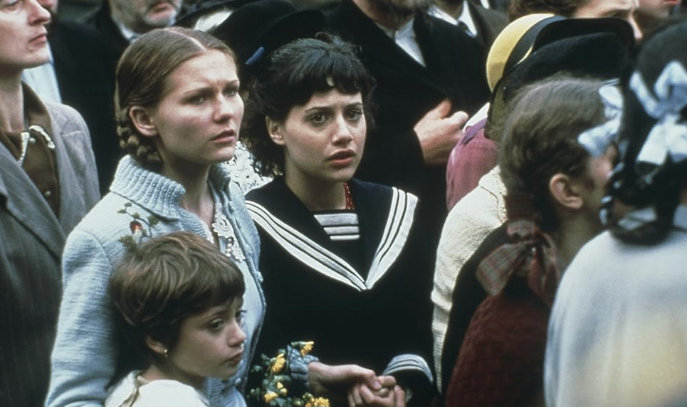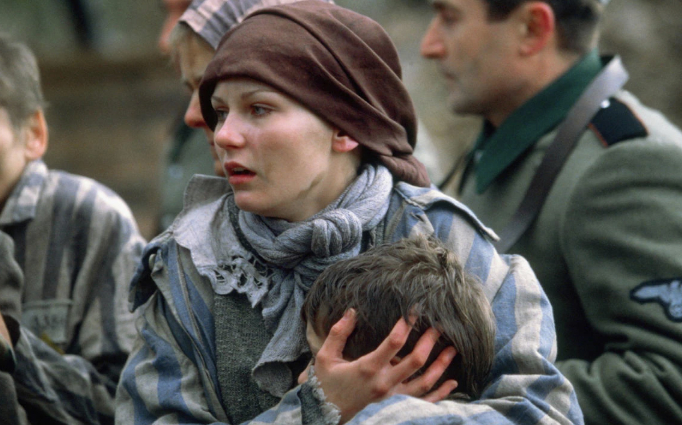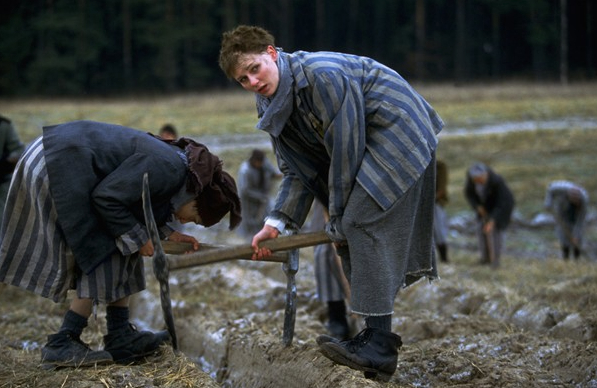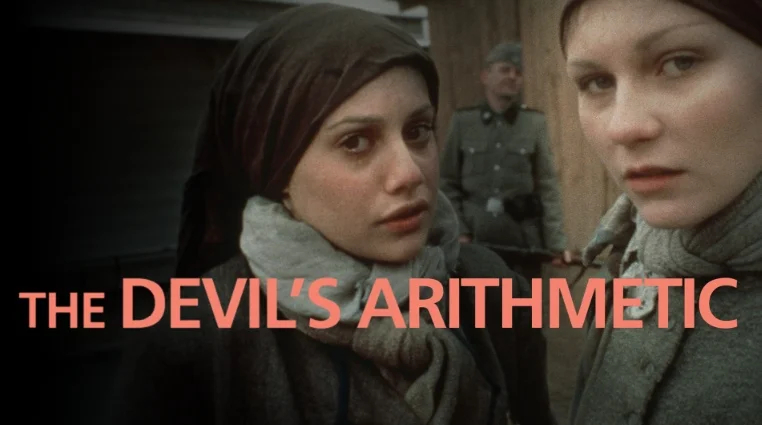The Devil’s Arithmetic (1999)
Genre: Historical Drama · Fantasy · War
Director: Donna Deitch
Writer: Robert J. Avrech (screenplay), based on the novel by Jane Yolen
Starring: Kirsten Dunst, Brittany Murphy, Louise Fletcher, Mimi Rogers
Running Time: 95 minutes
Original Network: Showtime
I. INTRODUCTION: WHEN THE PAST FINDS THE PRESENT
The Devil’s Arithmetic is a quiet yet devastating film that fuses history and fantasy to bridge generational memory. Adapted from Jane Yolen’s award-winning novel, the film uses a time-travel premise not to romanticize the past, but to confront it—with raw honesty and emotional urgency.
Set partly in modern-day America and partly in Nazi-occupied Poland, the film follows Hannah Stern, a disaffected Jewish teenager who regards her family’s stories about the Holocaust as tiresome and irrelevant. But when a ritual door is opened during Passover, she is pulled back in time into the identity of Chana, a girl living moments before a Nazi roundup.
What unfolds is a harrowing journey through one of history’s darkest chapters, seen through the eyes of someone who never expected to care. The story is not just about history—it’s about the inheritance of memory, the value of empathy, and the price of forgetting.
II. PLOT OVERVIEW: FROM INDIFFERENCE TO IMMERSION
Hannah Stern (Kirsten Dunst) is a typical American teenager: skeptical of tradition, disconnected from her Jewish roots, and bored with her family’s rituals. During the family’s Passover Seder, she is asked to perform a symbolic act—opening the door for the prophet Elijah, as per custom.
But the moment she turns the doorknob, she is inexplicably transported to a Polish shtetl in the 1940s, now seen by everyone as “Chana,” a local Jewish girl. Before she can fully grasp what’s happening, the village is raided by Nazis, and she is forced into a cattle car bound for a concentration camp.
In the camp, she befriends Rivka (Brittany Murphy), a spirited and faithful girl who teaches her how to survive. Alongside her are others—women, children, elders—who live each day hoping not to be selected for death. As Chana, Hannah must confront brutality, fear, and the slow erosion of identity. But unlike the others, she knows—on some level—how this ends.
The climax comes when Hannah, fully embodying Chana, makes a shocking sacrifice to save Rivka—an act that becomes the emotional core of the film. When Hannah returns to the present, the experience has changed her forever. She now understands that memory is not a burden—it’s a legacy.
III. THEMATIC ANALYSIS
A. Memory and Historical Responsibility
The title itself—The Devil’s Arithmetic—refers to the relentless counting of lives lost, the numbers tattooed on arms, the bureaucratic dehumanization of genocide. The film suggests that the “arithmetic” of evil can only be resisted by the arithmetic of memory: adding names, remembering faces, telling stories.

Hannah’s transformation from apathy to understanding mirrors the journey that every generation must take when faced with inherited trauma. The past is not merely something that happened—it’s something that lives on, and must be actively preserved through remembrance.
B. The Loss and Rebuilding of Identity
In the camps, Hannah’s real name and memories are stripped away. She becomes “Chana,” indistinguishable from the others, her individuality flattened by cruelty. This loss reflects the broader historical erasure inflicted by the Holocaust. Yet, the film is careful to reclaim identity—through storytelling, singing, and quiet acts of rebellion, the prisoners preserve fragments of their culture.

C. Faith and Ritual as Anchors
Passover—the festival of liberation—is used as a framing device for a story about captivity. It’s a poignant contrast that deepens as the film progresses. Ritual, in this context, is no longer hollow; it is what binds generations across time. By the end, Hannah finally understands the sacredness of the stories she once dismissed.
IV. PERFORMANCES
- Kirsten Dunst delivers a nuanced performance as Hannah/Chana, capturing both teenage detachment and eventual moral awakening. Her arc is subtle, but powerful.
- Brittany Murphy shines as Rivka, infusing her character with innocence, faith, and quiet resilience. She provides the film’s emotional center.
- Louise Fletcher adds gravitas in a brief but important role as the elderly Rivka, who bridges past and present.
- Mimi Rogers and the supporting cast provide grounded portrayals of family, loss, and spiritual survival.
V. CINEMATIC STYLE & TONE
While modest in budget, the film is visually effective. The transition from suburban America to 1940s Poland is done without spectacle—but this simplicity works in its favor. The cinematography in the camp scenes is stripped-down and raw, often lingering on faces, silence, and the banality of evil.

The music is understated, letting emotional beats speak for themselves. Director Donna Deitch handles the material with great care, avoiding sensationalism in favor of emotional resonance.
VI. EDUCATIONAL & CULTURAL SIGNIFICANCE
The Devil’s Arithmetic is frequently used in classrooms for its accessibility to younger audiences. It introduces the Holocaust not through data or historical abstraction, but through emotion, relationships, and human experience. Importantly, it doesn’t shield the viewer from horror, but neither does it exploit it.
The film stands as a call to remember—not just the facts of the Holocaust, but the names, the stories, the souls. It aligns with Elie Wiesel’s belief that “to forget a Holocaust victim is to kill them a second time.”
VII. FINAL VERDICT
The Devil’s Arithmetic is not a film of grand scale or special effects—it is a film of emotional truth. Through a compelling narrative, strong performances, and a powerful moral message, it invites viewers—especially young people—to engage with the past in a personal, profound way.

It reminds us that history is not finished, and that the act of remembering is itself a form of resistance.
🔍 RATING
| Category | Rating |
|---|---|
| Story & Structure | ★★★★☆ |
| Thematic Depth | ★★★★★ |
| Performances | ★★★★☆ |
| Direction & Tone | ★★★★☆ |
| Educational Value | ★★★★★ |
#TheDevilsArithmetic #HolocaustCinema #KirstenDunst #JewishMemory #HistoricalDrama #NeverForget #BrittanyMurphy #JaneYolen
